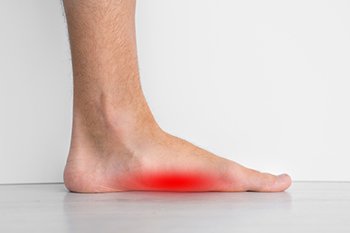
Rigid flat feet are evident by the lack of arch while standing. Some people can see an arch when they’re sitting down which is referred to as flexible flat feet. Both conditions may cause the feet to feel achy, and there are specific stretches that may help to alleviate this. There are small muscles inside the foot that can improve the foot arch, and the short foot exercise may help to strengthen these muscles. This is done by keeping the foot on the floor while sitting in a chair, and sliding the front of the foot along the floor toward the heel. This is most effective when repeated up to ten times and after holding for several seconds. The calf stretch is a popular exercise to perform that may help to strengthen flat feet. This is done by standing against a wall, and extending one leg back until a gentle stretch is felt. If you would like more information about how to improve flat feet, please ask a podiatrist who can provide you with additional stretching techniques.
Flatfoot is a condition many people suffer from. If you have flat feet, contact Afsha Naimat-Shahzad, DPM from Leander Foot & Ankle. Our doctor will treat your foot and ankle needs.
What Are Flat Feet?
Flatfoot is a condition in which the arch of the foot is depressed and the sole of the foot is almost completely in contact with the ground. About 20-30% of the population generally has flat feet because their arches never formed during growth.
Conditions & Problems:
Having flat feet makes it difficult to run or walk because of the stress placed on the ankles.
Alignment – The general alignment of your legs can be disrupted, because the ankles move inward which can cause major discomfort.
Knees – If you have complications with your knees, flat feet can be a contributor to arthritis in that area.
Symptoms
- Pain around the heel or arch area
- Trouble standing on the tip toe
- Swelling around the inside of the ankle
- Flat look to one or both feet
- Having your shoes feel uneven when worn
Treatment
If you are experiencing pain and stress on the foot you may weaken the posterior tibial tendon, which runs around the inside of the ankle.
If you have any questions please feel free to contact our office located in Leander, TX . We offer the newest diagnostic and treatment technologies for all your foot and ankle needs.

